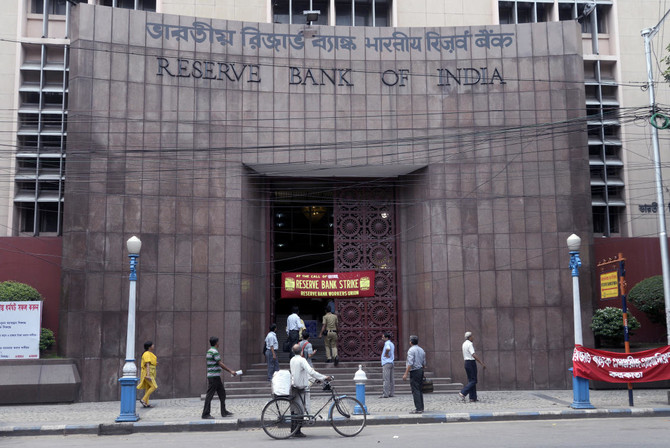BENGALURU: The Reserve Bank of India is likely to leave interest rates unchanged at its December policy meeting and through the end of next year, despite expectations that inflation will breach its 4 percent target in the next few months, a Reuters poll showed.
The results, from a poll of economists taken over the past week, also found there is a bigger risk the next move is a cut, even though forecasts diverge in three directions starting from the second quarter of next year.
That suggests both that policymakers have little room for maneuver and the outlook for rates beyond the next few months is exceptionally fuzzy, with several respondents saying they were unwilling to look much beyond the turn of the year.
The poll comes at a possible turning point for Asia’s third- largest economy, with a separate Reuters survey showing economists now expect a rebound in economic growth after five consecutive quarters of deceleration.
“In the RBI’s perception, inflation is inching up and the risks of that remaining high remain for a longer duration, say a couple of quarters or so, it may be difficult for the RBI to consider a rate cut around that scenario,” said Shubhada Rao, chief economist at Yes Bank in Mumbai.
“In our opinion, a December rate cut is ruled out. Maybe next year (but) a lot depends on how inflation plays out,” said Rao, who was the most accurate forecaster on the Indian economy in Reuters Polls last year.
The latest survey found 52 of 54 economists expected the RBI to hold the repo rate at 6.0 percent on Dec. 6, with just two forecasting a 25-basis-point cut to 5.75 percent.
The RBI’s Monetary Policy Committee at its meeting in October expressed concern about rising inflation, one of the reasons it decided to keep rates steady then. Inflation rose to 3.6 percent at last count, the highest in seven months.
In the poll, 20 of 26 economists who answered an additional question said inflation was likely to rise above the RBI’s 4 percent medium-term target by March, with forecasts split nearly evenly between the current quarter and early 2018.
But not all economists were concerned about inflation, which is still low by historical standards.
Finance ministry officials told Reuters that India’s government is lobbying for a rate cut.
“We expect the RBI to cut policy rates, if not in December then in its next policy review,” one ministry official told Reuters on condition of anonymity.
Prime Minister Narendra Modi’s government has hit the economy with sweeping changes over the past year by removing more than 85 percent of the currency in circulation as well as implementing a new national goods and services tax.
But if the RBI were to cut rates, it would be out of step with the latest trend among major central banks, which are now looking to either tighten policy or move away from ultra-easy policy in place since the financial crisis a decade ago.
The US Federal Reserve has been raising rates for the last two years, the Bank of Canada has lifted them twice this year and even the Bank of England put up borrowing costs earlier this month, in part on inflation concerns.
The global economy is also fairly strong, with most economies growing simultaneously. Yet at its last policy review, the RBI cut its growth outlook for the current fiscal year to 6.7 percent from 7.3 percent, suggesting it is not close to considering raising rates.
The latest Reuters poll found economists overwhelmingly expected no changes to that domestic outlook at the December policy meeting, further evidence that the repo rate is likely to remain on hold at 6.0 percent then and for a while longer.
Sajjid Chinoy, chief India economist at JP Morgan, wrote in a recent note to clients that the significant rise in oil prices over recent months, which will pinch consumers through higher inflation, is a good reason for pause.
“The resulting jump in inflation, which we now see rising to above 4.5 percent next quarter, is likely to keep the RBI cautious at its December review.”
Poll: Indian inflation likely to rise, interest rates won’t, economists say
Poll: Indian inflation likely to rise, interest rates won’t, economists say

Saudi crude exports reach 9-month high: JODI

RIYADH: Saudi Arabia’s crude exports reached 6.41 million barrels per day in March, according to an analysis from the Joint Organizations Data Initiative.
This figure increased by 96,000 bpd, or 1.52 percent, compared to the previous month, marking a nine-month high.
Furthermore, the data indicated that the Kingdom’s crude production fell to 8.97 million bpd, reflecting a monthly decrease of 0.42 percent.
This can be linked to the voluntary oil production cuts adopted by members of the Organization of the Petroleum Exporting Countries and their allies, known as OPEC+. Saudi Arabia announced in March the extension of its 1 million bpd cut, initially implemented in July 2023, until the end of the second quarter of 2024.
The Ministry of Energy said that the Kingdom’s production will be approximately 9 million bpd until the end of June.
Meanwhile, refinery crude output, representing the processed volume of crude oil yielding gasoline, diesel, jet fuel, and heating oil, fell by 4 percent compared to the previous month, reaching 2.56 million bpd, according to JODI data.
Saudi Arabia’s direct burn of crude oil, which involves using oil without substantial refining processes, decreased by 53,000 bpd in March, representing a 14.7 percent fall compared to the preceding month. The total direct burn for the month amounted to 307,000 bpd.
The Ministry of Energy aims to enhance the contributions of natural gas and renewable sources as part of the Kingdom’s goal to achieve an optimal, highly efficient, and cost-effective energy mix.
This involves replacing liquid fuel with natural gas and integrating renewables to constitute approximately 50 percent of the electricity production energy mix by 2030.
Oil Updates – prices fall on demand fears over Fed’s rates path

TOKYO: Oil prices extended losses in Asia trade on Tuesday, with investors anticipating lingering US inflation and higher interest rates to depress consumer and industrial demand, according to Reuters.
Brent crude futures fell 57 cents, or 0.68 percent, to $83.14 a barrel by 9:13 a.m. Saudi time. US West Texas Intermediate crude slipped 58 cents, or 0.73 percent, to $79.22 a barrel.
Both benchmarks fell less than 1 percent on Monday as US Federal Reserve officials said they were awaiting more signs of slowing inflation before considering interest rate cuts.
“Fears of weaker demand led to selling as the prospect of Fed rate cut became more distant,” said analyst Toshitaka Tazawa at Fujitomi Securities.
Fed Vice Chair Philip Jefferson said on Monday it was too early to tell whether the inflation slowdown is “long lasting,” while Vice Chair Michael Barr said restrictive policy needs more time. Atlanta Fed President Raphael Bostic said it will “take a while” for the central bank to be confident that a price growth slowdown is sustainable.
All in all, the Fed officials’ comments pointed to interest rates staying higher for longer than markets expect. That has implications for the oil market as higher borrowing costs tie up funds in a blow to economic growth and demand for crude.
On the other hand, the market appeared little affected by political uncertainty in two major oil-producing countries.
“While there has been an upmove over some uncertainty in Iran, prices have since pared back some gains, as investors price for the status-quo in terms of policies for now and that any wider regional conflict remains off the table,” IG market strategist Yeap Jun Rong said in an email to Reuters.
Investors are focusing on supply from the Organization of the Petroleum Exporting Countries and its affiliates, together known as OPEC+. They are scheduled to meet on June 1 to set output policy, including whether to extend some members’ 2.2 million barrels per day of voluntary cuts.
“Prices remain in wait for a catalyst to drive a breakout of the current range, with eyes still on any geopolitical developments, along with oil inventories data this week,” IG’s Yeap said.
OPEC+ could extend some voluntary output cuts if demand fails to pick up, people with knowledge of the matter previously told Reuters.
Wizz Air aims to expand connections, attract more tourists into Saudi Arabia, says senior executive

RIYADH: Low-cost carrier Wizz Air plans to invest over half a billion dollars in flight operations in Saudi Arabia to enhance connectivity and attract more tourists, according to the airline’s president.
In an interview with Arab News on the sidelines of the Future Aviation Forum, Robert Carey emphasized the impact on tourism, noting that inbound visitors typically stay for three to seven days and spend money on various services like hotels, car rentals, and food.
“We’ve invested over half $1 billion into our flying in the Kingdom so far. we’re going to keep growing that. I think we’ve got a lot to do. Just keep connecting the destinations we’ve already got, connect more of those points together,” Carey said.
Wizz Air is the third-largest low-cost carrier in Europe and the fifth-largest airline e-commerce site globally. It aims to bring more tourists to Saudi Arabia and enhance its accessibility, with plans to continue connecting existing destinations and expand further.
“We’re operating to seven different destinations from Saudi Arabia. We have four points here. You know, we’re seeing really great consumer response to this. Roughly two to one external like people coming into the Kingdom versus people leaving the Kingdom, on trips,” Carey said.
He added: “But that’s giving a great benefit. We’ve got tourists coming in. We’re giving access to Saudi customers who have travel.”
He also expresses the airline’s positive passenger experience, praising the airline’s clean, new planes, welcoming flight crew, and on-time scheduling.
Additionally, Carey stated that Wizz is working with the minister of tourism, the minister of transport, the General Authority of Civil Aviation, and the Saudi Tourism Authority on their connectivity program.
“If you look at the airline planning season, we’re just coming up on the period where everybody starts announcing what they’re going to do for this winter, so all I’ll say for right now is stay tuned. There’s more to come,” he said.
Carey noted that Wizz Air celebrated its 20th birthday this week, and to mark this milestone, the airline will launch a special promotion on May 21.
He hints that the promotion will be closely related to the anniversary, suggesting significant discounts on every flight. They encourage people to visit the website to take advantage of the upcoming offers.
AI to help optimize Saudi aviation supply chain management: official

RIYADH: Saudi Arabia’s aviation industry’s supply chain management is set to receive a boost thanks to the use of artificial intelligence in logistics, a top official said.
Speaking on the first day of the Future Aviation Forum in Riyadh on Monday, Suliman Almazroua, CEO of the National Industrial Development and Logistics Program, said that AI implementation will also enhance productivity and customer experience.
“AI in logistics, for example, is shaping and optimizing the supply chain management, improving productivity, productivity maintenance, and enhancing customer experience,” he said.
The official said the rapid technological advancements are reshaping the future of industries.
The CEO highlighted the Saudi aviation sector’s achievements in terms of increased number of passengers, cargo handling, fleet expansion, rise in infrastructure investment, and global connectivity.
Addressing the forum, Luis Felipe de Oliveira, director general and CEO of Airports Council International shed light on how the aviation industry suffered from different crises.
“I remember from 9/11 to (the 2008) financial crisis to SARS to COVID-19, we always faced an issue, but we are a very resilient industry and we always come back,” Oliveira noted.
He said: “That’s why when you talk about macroeconomic stuff, we see that geopolitical risks are something that can affect us. That we have the inflation going up, of course, affects our business as well. We have the interest rates that affect our GDP.”
“But it is incredible that even considering all these headwinds, the unemployment rate is going down and people are eager to travel,” Oliveira justified.
He also talked about how jet fuel prices, which are the main cost for the industry, are very high nowadays.
“Of course, this affects our ability to fly and also affects the cost of the tickets,” Oliveira said.
Stefan Schulte, CEO of Fraport AG in Germany, clarified that the focus on innovation, sustainability, and connecting people and culture resembled the beginning of a new era.
“The expectations of our customers are constantly increasing. They want consistent, digitalized, resilient, and seamless processes, but they also want us to go green,” Schulte said.
Organized by the General Authority of Civil Aviation, the three-day event will see discussions on issues related to the global flight sector, air transport, and environmental sustainability in civil aviation, as well as talks on enabling advanced air transport and enhancing global connectivity.
The event also aligns with the Kingdom’s ambition to become a leader in the sector within a decade, including securing $100 billion worth of investments by 2030.
Electric passenger drones set for a year-end launch in Saudi Arabia, says Front End CEO

RIYADH: Electric passenger drones are set to be launched in Saudi Arabia by the end of this year with Alkhobar-based firm Front End set to introduce the service to the Kingdom, revealed its CEO.
Speaking to Arab News on the sidelines of the Future Aviation Forum, Majed Al-Ghaslan, who is also the chairman of the company, stated that Front End’s collaboration with the Chinese electric vertical take-off and landing vehicle developer EHang is facilitating the deployment of such electric flights in the Kingdom.
Al-Ghaslan said: “We’re pushing the boundary of air traffic, also urban traffic management systems. So we’re discussing this with the Civil Aviation Authority (General Authority of Civil Aviation) here in the Kingdom. We’re very closely aligned with the Ministry of Transport.”
He added: “We have electric buses and cars now; you’re going to have electric flights for passengers. And this is already running in many cities around the world. We want Riyadh and the major cities around the Kingdom to be the first as well. The idea is to launch the pilots this year and hopefully start launching this service as well this year.”
The official also added that the deployment of these electric drones, capable of carrying passengers, in the Kingdom is very feasible, as such services are running effectively in countries like China, Indonesia, and Japan.
During the talk, he revealed that these proposed electric flights, which take off vertically, can be used for both carrying passengers and for logistics purposes.
According to Al-Ghaslan, these flights are capable of traveling up to 30 minutes with two passengers, and with more advanced batteries, the distance can be extended further.
He explained, “You can do a 30-minute flight, but still, 30 minutes is a long flight. For example, in Riyadh, you can cover end to end because you are going direct path to anywhere, with two passengers. So you can take up to 250 kilograms. And then with more advanced batteries, the distance can be even higher.”
The official added that the drones capable of carrying passengers, which will be introduced in Saudi Arabia, will be autonomous and will operate using advanced technologies like artificial intelligence.
Discussing Front End’s eagerness to enter the air mobility sector, Al-Ghaslan noted that the Kingdom’s transformative Vision 2030 program has facilitated the firm’s entry into the industry.
“Typically, what we do is partner with and localize companies, bringing them into the Kingdom. I never thought I’d be in aviation, but because of the new frontiers that include electric vehicles that vertically take off and land, and advancements in passenger-level drones, that is our interest. We run drone services for our clients, but we are now getting into the air mobility sector,” said Al-Ghaslan.
He added, “The Vision 2030 program actually enabled this transformation to take place, and there are now national-level strategies. We are at the forefront of making it happen from the private sector at least.”
The official also noted that Front End is planning to introduce a ride-hailing service in Saudi Arabia using a fleet of electric vehicles, under a partnership with an Indian company named Blue Smart.
“We’re also launching a ride-hailing service. So, this is something we’re also going to be announcing at the right time, again, electric. So, our theme is around sustainability as well. It’s a company from India called Blue Smart. And this is also going to be announced this year,” he concluded.
















